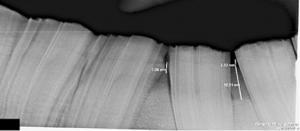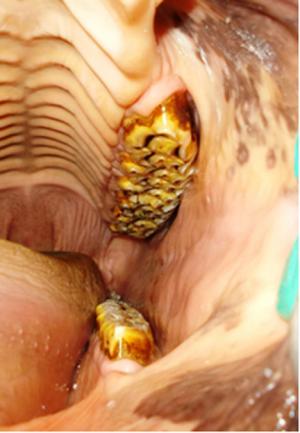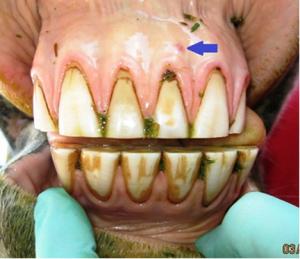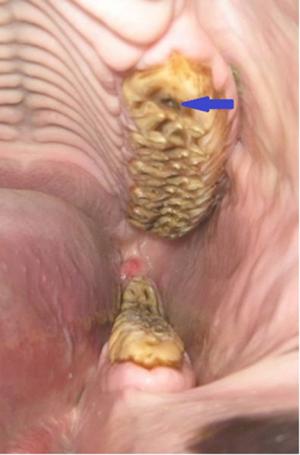Stephen S. Galloway, DVM
Many horse owners are unfamiliar with equine dental care, and much of the information on the internet is either out of date or misleading. Throughout the 20th century, equine dentistry progressed little and was limited to floating and extracting teeth. Over the past 20 years, traditional dental practices have been evaluated and new tooth-saving dental procedures have been introduced. The purpose of this article is to dispel common misconceptions and outdated dental practices.
Myth: Dental problems usually occur in senior horses, and the most common sign of dental disease is dropping feed.
Most dental problems start in the 2 to 5-year-old juvenile horse, progressively getting worse with age. Many owners do not consider providing dental care until their horse is 10 to 12 years old. Dental disease occurs with the same frequency in all equine age groups, and the only factor shown to decrease the progression of dental disease is Grazing Time.
Horses are designed to eat grass approximately 18 hours per day, and naturally, the more time spent grazing the fewer dental problems typically diagnosed. Conversely, horses that are routinely stabled and fed concentrated diets have many more dental problems than their pastured buddies. Unfortunately, there are not enough hours in a day to allow for extended grazing time for athletic and working horses; therefore, regular examinations are recommended to prevent serious dental problems.
Dropping feed is probably the most common sign of advanced dental disease. Most horses with mild to moderate disease show no signs related to mastication or digestion because eating is a survival function. Since horses are prey animals, pain and injury are instinctively masked. Depending on the pain tolerance of the individual horse, discomfort from dental disease often goes unnoticed or may be expressed as subtle behavioral and performance problems.
Myth: Equine Dentistry is “Extra Care!”
Dentistry is best addressed as preventative healthcare in all species! The goal of dentistry is to maintain functional dentition and to relieve pain in order to improve mastication, longevity, and quality of life. The only effective and affordable way of accomplishing this goal is through preventative care and early diagnosis and treatment of problems.
Preventative healthcare should beindividualized for each horse and based upon a risk assessment including use, stabling/environment, travel, age, and other health conditions. Most horse owners routinely deworm their horses for intestinal parasites several times a year, while less than 20% of horses have a treatable parasite burden. Most horse owners routinely vaccinate their horses at least once a year while less than 1% of the horses will be clinically infected by all of these diseases combined. Over 70% of horses have dental disease, and less than 1% of these horses will ever receive dental care. My point is NOT to imply that vaccinations should not be given. The low incidence of these fatal and debilitating diseases is the result of widespread vaccination of the horse population. My suggestion is that equestrians also consider dentistry a part of the preventative care program to extend their horse’s productive lifespan and to improve his/her quality of life during the golden years.
Myth: Dentistry will make my horse perform better!
Not Really! The goal of dentistry is to improve mastication and relieve pain! Anyone who has had a toothache knows that oral pain can be debilitating and that over time oral pain is referred to other parts of the body (e.g. headaches, neck and back pain). Pain relief allows an athlete to perform to his/her potential without noxious distractions.
During the 1990s the observation that horses often performed better after dental care created an enthusiastic market for Performance Dentistry which included aggressive procedures such as canine tooth reshaping, bit seating, wolf tooth extraction, and prescheduled baby tooth extractions. These procedures quickly became the routine dental package for all horses. Most horses only need minor dental corrections to chew and perform optimally, and current dental care standards do not support performance procedures.
Myth: Equine Dentistry is a benign procedure.
No! Teeth are living organs, and not blocks of ivory. Aggressive floating with power instrumentation can injure teeth, causing them to die slowly and painfully. It may take several years before the teeth shows signs of infection. While horse teeth erupt into the mouth over the life of the horse, each tooth has a limited lifespan. Aggressive floating removes excessive tooth crown unnecessarily, shortens the functional life of the tooth, and thereby shortens the lifespan of the horse.
Many owners have been told that it is normal for their horse to not eat for a period of time following a dental procedure. This statement defies common sense! Horses instinctively eat all day, every day, and not eating is a sign of trouble under any circumstance. Most horses will eat immediately following dental procedures including major extractions. The most common cause of not eating after dentistry is a vital pulp exposure in a tooth, which requires immediate treatment to prevent irreversible damage to the tooth.
Myth: Power floating is better than hand floating. Hand floating is safer the power floating.
Like any skill, the training of the operator is far more important than the operator’s choice of tools. In general, hand floats are “safer” then power instruments in the hands of an inexperience or incorrectly trained operator; however, working on several horses with hand floats is strenuous and can fatigue the floater and cause operator error. On the other hand, power instruments cause little operator fatigue and allow for precise corrections, but can also cause irreversible tooth damage in less than a minute.
Many horses have suffered unnecessarily from power instruments in the hands of incorrectly trained operators who try to sculpt the teeth of every horse into a preconceived ideal dental conformation. Common marketing terms for this dental philosophy are occlusal equilibration, balancing the mouth, three-point balance, simultaneous centric occlusion, and TMJ dentistry. Each horse should be treated individually based upon his/her unique conformational features, and most horses only require minor treatment to produce a functional, pain free occlusion. After a thorough oral examination which may take 30+ minutes to perform, a properly trained dentist using power instruments should be able to float most horses in less than 5 minutes.
Myth: Equine sedatives are safer than human sedatives.
There are NO safe anesthetics, only safe anesthesiologists! To protect both animals and people, federal laws restrict the use of sedatives to licensed veterinarians. Sedation is required to properly perform an oral examination on a horse and to safely use power instrumentation; therefore, many unlicensed dental providers are illegally sedating horses. Some, knowing it is illegal, actually have horse owners administer the sedation to their own horses. While this act may (or may not) legally distance the unlicensed practitioner from the act of sedating the horse, it does not distance the horse from the potential complications of the drug. Anyone who has seen one of the 2% of healthy horses that has had a complication from sedation will tell you that it is best to have a veterinarian standing next to your horse when sedation goes bad!
Myth: An Equine Dentist is the best person to perform Equine Dentistry.
The title “Equine Dentist” is a marketing scam!“Certified Equine Dentists” are neither licensed to practice nor trained in oral healthcare. The individuals who claim this title may, or may not, have completed a 2 to 3-week unaccredited short course on tooth floating. Tooth floating is a single, 5 minute, dental procedure within the healthcare discipline of dentistry. A short course certificate should not be confused with a license to practice, a 4-year veterinary degree, or a 4-year board certification program in dentistry.
Many horses suffer from unnecessary treatment and undiagnosed or misdiagnosed health conditions due to marketing confusion in many aspects of equine healthcare.
Also, the marketing allegation that veterinarians are not qualified to perform “equine dentistry” is not true. I have personally taught veterinary students in 11 of the 28 US veterinary colleges, including UT CVM, Miss St CVM, UGA CVM, and NCSU CVM, and dentistry is one of the most attended professional continuing education topics by equine veterinarians. Equine veterinarians are trained and equipped to examine, diagnose, and treat the entire horse, including the teeth and mouth, and they are the most qualified “dentists” to manage your horse’s oral healthcare needs.
Ultimately the decision of who provides healthcare for a horse should be determined by the horse’s owner; however, owners do have the right to make an informed decision before choosing this provider. Owners are encouraged investigate the qualifications of anyone offering to performing healthcare services on their horses. When in doubt about a person’s qualifications, contact the TN Board of Veterinary Medical Examiners [https://tn.gov/health/topic/vet-board (615-532-5090)].
In summary, equine dentistry should be a part of the preventative healthcare services provided to horses of all ages. Dental problems are best prevented or treated early – before the condition advances and requires expensive treatment. Equine sedation and dental procedures are not inherently safe or benign, and should be performed by licensed veterinarians who have the training and resources to provide healthcare for your entire horse.
About the author: Dr. Stephen Galloway practices in Oakland, TN. He is a Diplomate of the American Veterinary Dental College and is a board-certified specialist in Equine Dentistry and Oral & Maxillofacial Surgery.
Many horse owners are unfamiliar with equine dental care, and much of the information on the internet is either out of date or misleading. Throughout the 20th century, equine dentistry progressed little and was limited to floating and extracting teeth. Over the past 20 years, traditional dental practices have been evaluated and new tooth-saving dental procedures have been introduced. The purpose of this article is to dispel common misconceptions and outdated dental practices.
Myth: Dental problems usually occur in senior horses, and the most common sign of dental disease is dropping feed.
Most dental problems start in the 2 to 5-year-old juvenile horse, progressively getting worse with age. Many owners do not consider providing dental care until their horse is 10 to 12 years old. Dental disease occurs with the same frequency in all equine age groups, and the only factor shown to decrease the progression of dental disease is Grazing Time.
Horses are designed to eat grass approximately 18 hours per day, and naturally, the more time spent grazing the fewer dental problems typically diagnosed. Conversely, horses that are routinely stabled and fed concentrated diets have many more dental problems than their pastured buddies. Unfortunately, there are not enough hours in a day to allow for extended grazing time for athletic and working horses; therefore, regular examinations are recommended to prevent serious dental problems.
Dropping feed is probably the most common sign of advanced dental disease. Most horses with mild to moderate disease show no signs related to mastication or digestion because eating is a survival function. Since horses are prey animals, pain and injury are instinctively masked. Depending on the pain tolerance of the individual horse, discomfort from dental disease often goes unnoticed or may be expressed as subtle behavioral and performance problems.
Myth: Equine Dentistry is “Extra Care!”
Dentistry is best addressed as preventative healthcare in all species! The goal of dentistry is to maintain functional dentition and to relieve pain in order to improve mastication, longevity, and quality of life. The only effective and affordable way of accomplishing this goal is through preventative care and early diagnosis and treatment of problems.
Preventative healthcare should beindividualized for each horse and based upon a risk assessment including use, stabling/environment, travel, age, and other health conditions. Most horse owners routinely deworm their horses for intestinal parasites several times a year, while less than 20% of horses have a treatable parasite burden. Most horse owners routinely vaccinate their horses at least once a year while less than 1% of the horses will be clinically infected by all of these diseases combined. Over 70% of horses have dental disease, and less than 1% of these horses will ever receive dental care. My point is NOT to imply that vaccinations should not be given. The low incidence of these fatal and debilitating diseases is the result of widespread vaccination of the horse population. My suggestion is that equestrians also consider dentistry a part of the preventative care program to extend their horse’s productive lifespan and to improve his/her quality of life during the golden years.
Myth: Dentistry will make my horse perform better!
Not Really! The goal of dentistry is to improve mastication and relieve pain! Anyone who has had a toothache knows that oral pain can be debilitating and that over time oral pain is referred to other parts of the body (e.g. headaches, neck and back pain). Pain relief allows an athlete to perform to his/her potential without noxious distractions.
During the 1990s the observation that horses often performed better after dental care created an enthusiastic market for Performance Dentistry which included aggressive procedures such as canine tooth reshaping, bit seating, wolf tooth extraction, and prescheduled baby tooth extractions. These procedures quickly became the routine dental package for all horses. Most horses only need minor dental corrections to chew and perform optimally, and current dental care standards do not support performance procedures.
Myth: Equine Dentistry is a benign procedure.
No! Teeth are living organs, and not blocks of ivory. Aggressive floating with power instrumentation can injure teeth, causing them to die slowly and painfully. It may take several years before the teeth shows signs of infection. While horse teeth erupt into the mouth over the life of the horse, each tooth has a limited lifespan. Aggressive floating removes excessive tooth crown unnecessarily, shortens the functional life of the tooth, and thereby shortens the lifespan of the horse.
Many owners have been told that it is normal for their horse to not eat for a period of time following a dental procedure. This statement defies common sense! Horses instinctively eat all day, every day, and not eating is a sign of trouble under any circumstance. Most horses will eat immediately following dental procedures including major extractions. The most common cause of not eating after dentistry is a vital pulp exposure in a tooth, which requires immediate treatment to prevent irreversible damage to the tooth.
Myth: Power floating is better than hand floating. Hand floating is safer the power floating.
Like any skill, the training of the operator is far more important than the operator’s choice of tools. In general, hand floats are “safer” then power instruments in the hands of an inexperience or incorrectly trained operator; however, working on several horses with hand floats is strenuous and can fatigue the floater and cause operator error. On the other hand, power instruments cause little operator fatigue and allow for precise corrections, but can also cause irreversible tooth damage in less than a minute.
Many horses have suffered unnecessarily from power instruments in the hands of incorrectly trained operators who try to sculpt the teeth of every horse into a preconceived ideal dental conformation. Common marketing terms for this dental philosophy are occlusal equilibration, balancing the mouth, three-point balance, simultaneous centric occlusion, and TMJ dentistry. Each horse should be treated individually based upon his/her unique conformational features, and most horses only require minor treatment to produce a functional, pain free occlusion. After a thorough oral examination which may take 30+ minutes to perform, a properly trained dentist using power instruments should be able to float most horses in less than 5 minutes.
Myth: Equine sedatives are safer than human sedatives.
There are NO safe anesthetics, only safe anesthesiologists! To protect both animals and people, federal laws restrict the use of sedatives to licensed veterinarians. Sedation is required to properly perform an oral examination on a horse and to safely use power instrumentation; therefore, many unlicensed dental providers are illegally sedating horses. Some, knowing it is illegal, actually have horse owners administer the sedation to their own horses. While this act may (or may not) legally distance the unlicensed practitioner from the act of sedating the horse, it does not distance the horse from the potential complications of the drug. Anyone who has seen one of the 2% of healthy horses that has had a complication from sedation will tell you that it is best to have a veterinarian standing next to your horse when sedation goes bad!
Myth: An Equine Dentist is the best person to perform Equine Dentistry.
The title “Equine Dentist” is a marketing scam!“Certified Equine Dentists” are neither licensed to practice nor trained in oral healthcare. The individuals who claim this title may, or may not, have completed a 2 to 3-week unaccredited short course on tooth floating. Tooth floating is a single, 5 minute, dental procedure within the healthcare discipline of dentistry. A short course certificate should not be confused with a license to practice, a 4-year veterinary degree, or a 4-year board certification program in dentistry.
Many horses suffer from unnecessary treatment and undiagnosed or misdiagnosed health conditions due to marketing confusion in many aspects of equine healthcare.
Also, the marketing allegation that veterinarians are not qualified to perform “equine dentistry” is not true. I have personally taught veterinary students in 11 of the 28 US veterinary colleges, including UT CVM, Miss St CVM, UGA CVM, and NCSU CVM, and dentistry is one of the most attended professional continuing education topics by equine veterinarians. Equine veterinarians are trained and equipped to examine, diagnose, and treat the entire horse, including the teeth and mouth, and they are the most qualified “dentists” to manage your horse’s oral healthcare needs.
Ultimately the decision of who provides healthcare for a horse should be determined by the horse’s owner; however, owners do have the right to make an informed decision before choosing this provider. Owners are encouraged investigate the qualifications of anyone offering to performing healthcare services on their horses. When in doubt about a person’s qualifications, contact the TN Board of Veterinary Medical Examiners [https://tn.gov/health/topic/vet-board (615-532-5090)].
In summary, equine dentistry should be a part of the preventative healthcare services provided to horses of all ages. Dental problems are best prevented or treated early – before the condition advances and requires expensive treatment. Equine sedation and dental procedures are not inherently safe or benign, and should be performed by licensed veterinarians who have the training and resources to provide healthcare for your entire horse.
About the author: Dr. Stephen Galloway practices in Oakland, TN. He is a Diplomate of the American Veterinary Dental College and is a board-certified specialist in Equine Dentistry and Oral & Maxillofacial Surgery.










